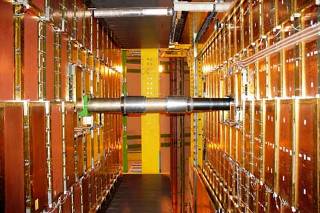Jun 8 2015
CERN’s Large Hadron Collider (LHC) has started delivering physics data for the first time in 27 months. After an almost two year shutdown and several months re-commissioning, the LHC is now providing collisions to all of its experiments – including the CMS and LHCb experiments involving scientists from the University of Bristol – at the unprecedented energy of 13 TeV, almost double the collision energy of its first run.
 View from the floor of the two walls M1 and M2 of the LHCb Muon detector © CERN
View from the floor of the two walls M1 and M2 of the LHCb Muon detector © CERN
This marks the start of season two at the LHC, opening the way to new discoveries. The LHC will now run round the clock for the next three years.
“It really is a voyage of discovery at this point,” Professor Dave Newbold, Head of Bristol’s Particle Physics Research Group, who works on the CMS experiment, commented to New Scientist. “There is this prospect of finding something completely new and not predicted by anybody at all.”
With run two, physicists have the ambition to further explore the Standard Model and even to find evidence of new physics phenomena beyond its boundaries, which could explain remaining mysteries such as dark matter, believed to make up about a quarter of the universe, or nature’s apparent preference for matter over antimatter, without which we would not exist.
Over the two-year shutdown, the four large experiments ALICE, ATLAS, CMS and LHCb also went through an important programme of maintenance and improvements in preparation for the new energy frontier.
“The collisions we are seeing today indicate that the work we have done in the past two years to prepare and improve our detector has been successful and marks the beginning of a new era of exploration of the secrets of nature,” said CMS spokesperson Tiziano Camporesi. “We can hardly express our excitement within the collaboration: this is especially true for the youngest colleagues.”
“All within the collaboration are tremendously excited that the new run has now begun,” said LHCb spokesperson Guy Wilkinson. “It will allow us to follow up on puzzles from our run-1 studies, and to probe with higher sensitivity the difference in behaviour between matter and antimatter.”